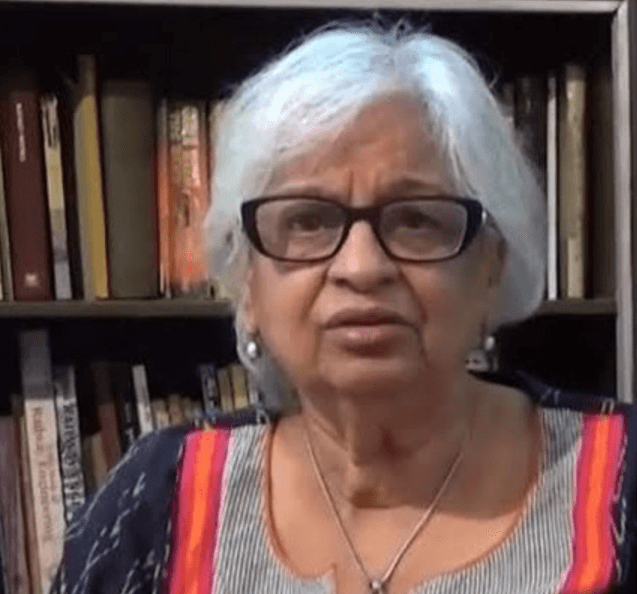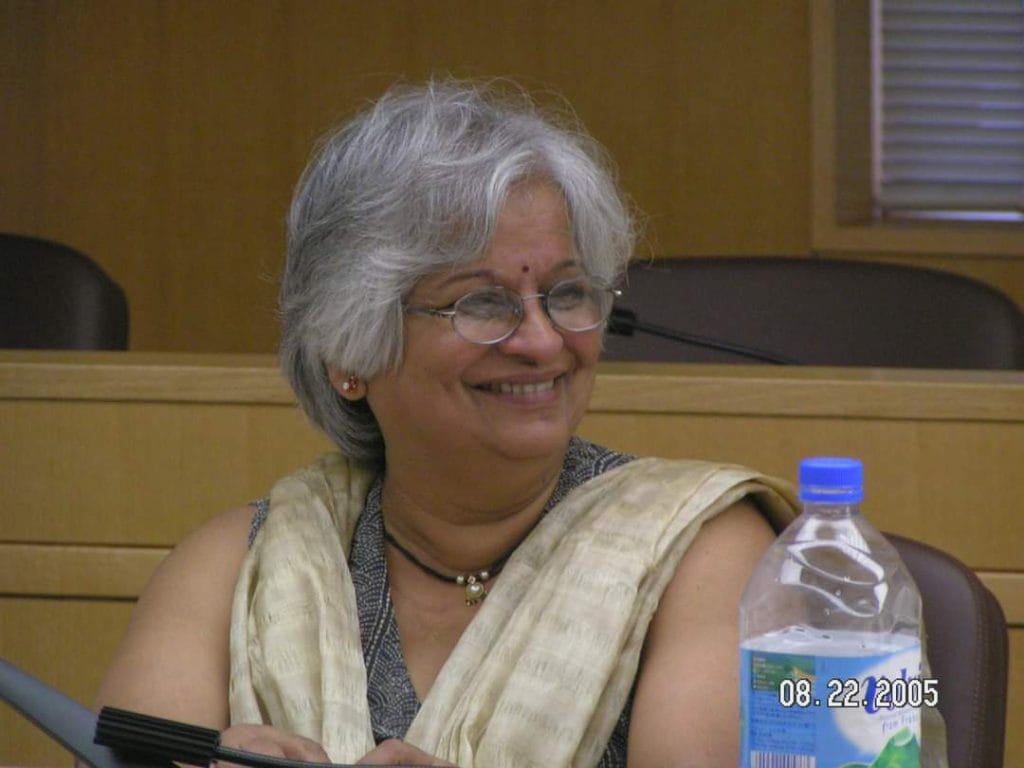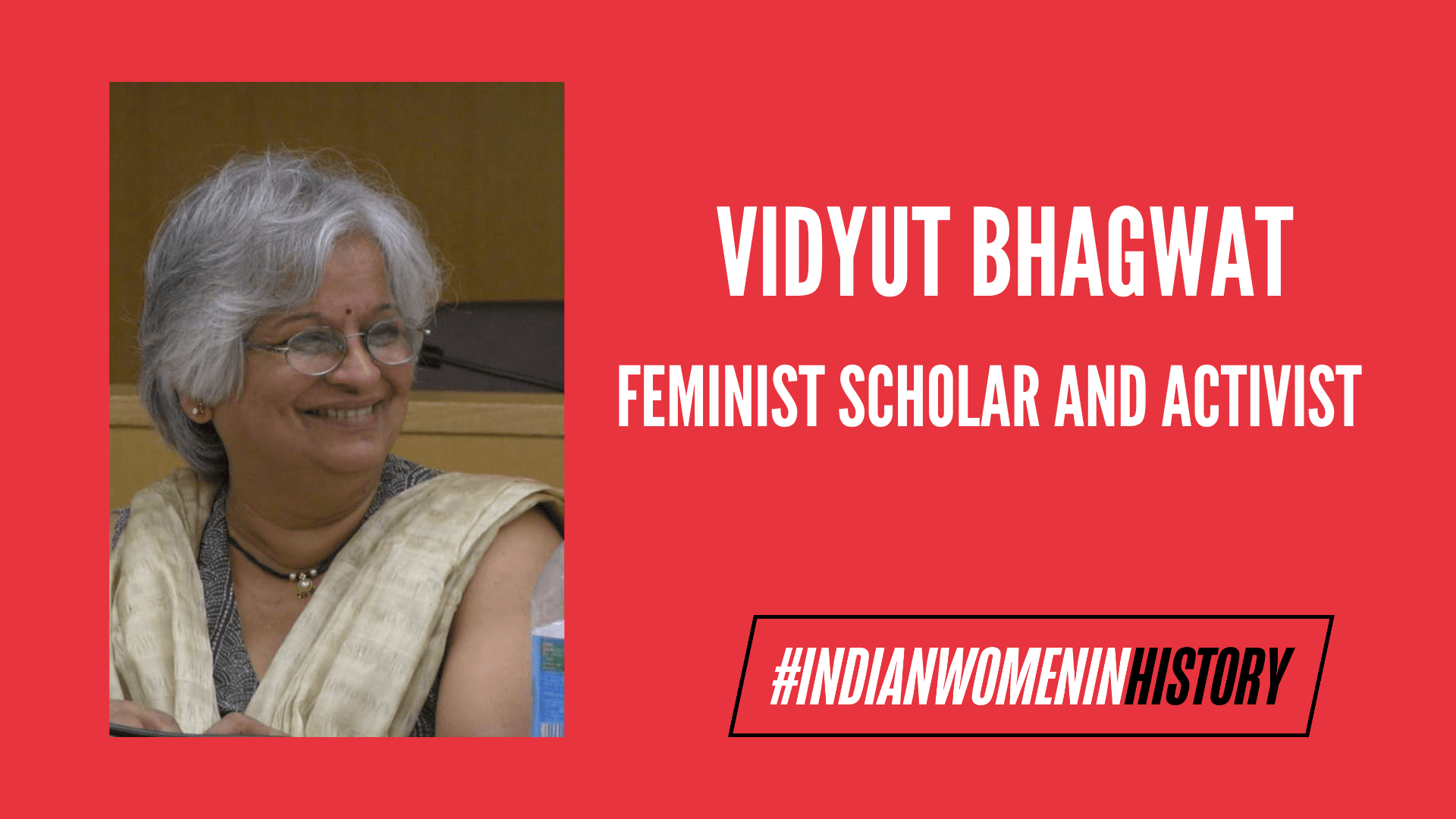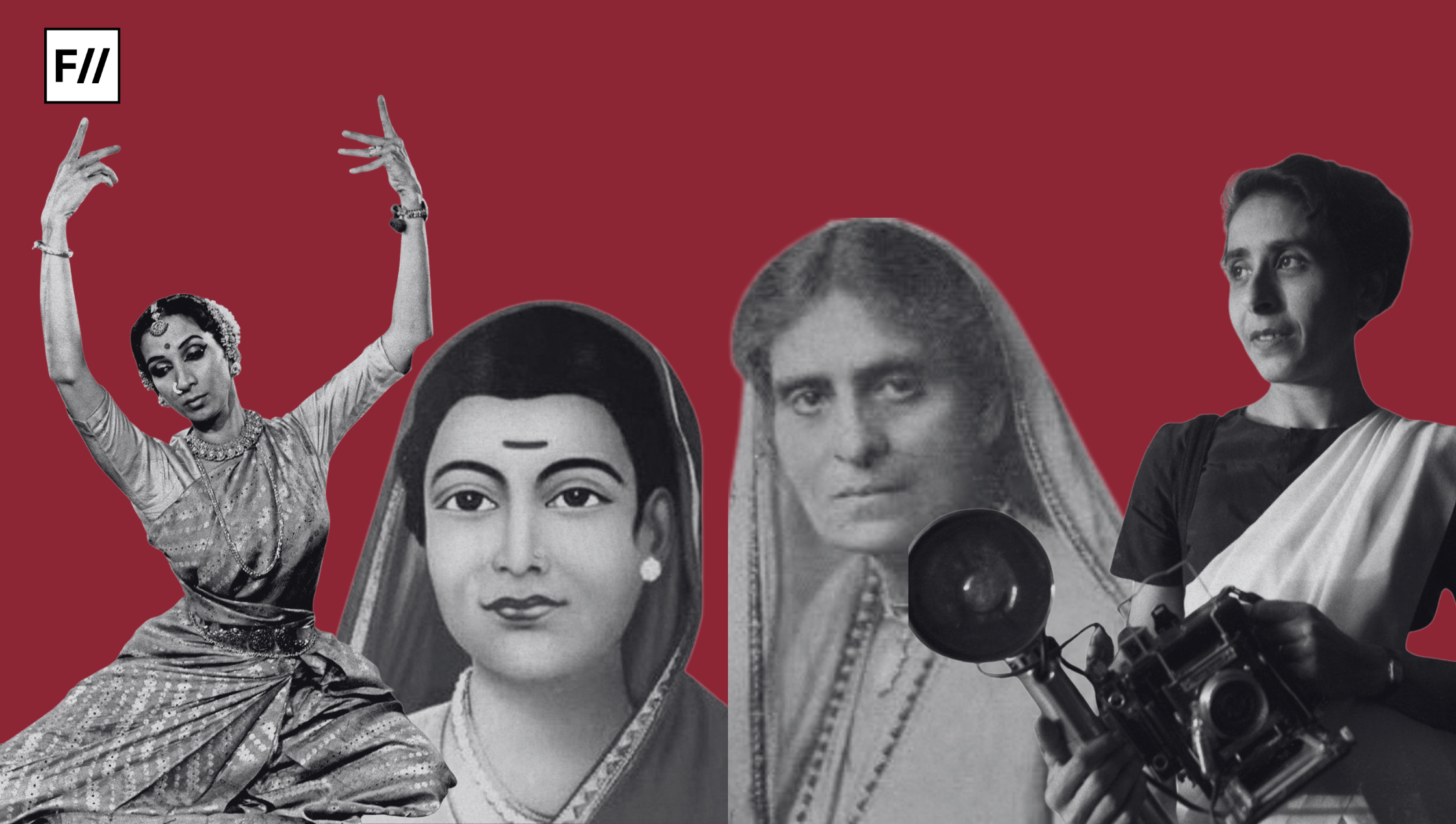An intersectional feminist scholar and activist who worked closely across gender, caste, and social justice, Professor Vidyut Bhagwat pioneered women’s studies in India. She was the founder and director of the Krantijyoti Savitribai Phule Women’s Studies Centre at Savitribai Phule Pune University, one of the leading institutions for women’s studies in India. She has written extensively in both English and Marathi languages focusing on the importance of intersectional feminism while addressing the woman question across the social history of Dalit and Farmer movements, especially in the context of Maharashtra.
Born and raised in Maharashtra, Professor Bhagwat’s work reflects the social dynamics of the state. As Professor Bhagwat witnessed the struggles faced by the marginalised, especially women, during the 1970s and the 1980s, she decided to dedicate her life towards understanding and breaking the structures of the society that perpetuate inequality and casteism. She critiqued Brahmanical Patriarchy, advocated for equality by demanding rights for Dalits and other marginalised castes, and bridged the gap between the woman question and the caste question.
Vidyut Bhagwat academic Journey
The correct term for describing Professor Bhagwat’s academic journey would be ‘interdisciplinary.’ She completed her Masters in Marathi Literature and PhD in Sociology with a focus on Women’s Studies from the University of Pune. Before pursuing her PhD, she also earned a Post-graduate certificate in Linguistics which made her work cross the barrier of language, making it more accessible and widespread across different institutional locations.

Professor Bhagwat taught at and retired as the Director of the Krantijyoti Savitribai Phule Women’s Studies Centre at Savitribai Phule Pune University which she helped establish in 1987. Under her guidance and leadership, the Centre made strides in breaking away from the dichotomy of academics and activism as she made sure that her students and the faculty actively engaged in praxis and tackled issues such as the hysterectomy of women with intellectual disabilities in government homes.
Professor Bhagwat made sure that the women’s movement in India remains connected with other social movements such as Dalit and Adivasi movements and peasant movements so that the interconnection between the woman and the caste question is not left out or dismissed.
As a mentor, Professor Bhagwat was able to successfully make her students understand the importance of praxis or the need to combine theory and actions together to make a change, which led to the Pune Women’s Studies Centre being recognised as an Advanced Centre by the University Grants Commission (UGC).
Professor Bhagwat’s academic journey played an essential role in establishing the basic foundation of her critical thinking as it made her question the norms and rules of the society that are fabricated in a way that favours a particular, dominant section of the society while oppressing the marginalised. In addition to her academics, the rise of the Dalit and feminist movements in the state of Maharashtra further made her opt for an intersectional approach to combat the complex patriarchal and casteist structure of society.
Activism and influence on people
The 1970s is considered a dark period because the increasing economic crisis marked stagnation and landlessness generalised discontent both in rural and urban areas, increasing the hardships faced by women. While the period also saw a rise in anti-dowry campaigns, protests against street sexual harassment of women, obscenity, price rise, and the hardships suffered by women living, Maharashtra witnessed widespread anti-price rise protests where women were active participants.

As an activist, Professor Bhagwat actively participated in the women’s movements and farmers’ movements since the 1970s. She dedicated her life towards bringing the complex category of ‘region,’ to the centre of historical, literary, and gender studies. She was an active participant in the farmer’s movement in Maharashtra alongside Sharad Joshi and other activists.
Professor Bhagwat made sure that the women’s movement in India remains connected with other social movements such as Dalit and Adivasi movements and peasant movements so that the interconnection between the woman and the caste question is not left out or dismissed.
As an academician and an activist, she critically engaged in institutional intervention. Her work served as a reminder for people that feminist policies require active critical engagement at the grassroots level which influenced many feminist thinkers. For instance, Sharmila Rege is renowned for advancing women’s studies in India by working on Dalit feminist theory. She was a colleague of Professor Bhagwat as she went on to become one of the acclaimed directors of the Krantijyoti Savitribai Phule Women’s Studies Centre by following Professor Bhagwat’s path as they both viewed the field of social science as a tool for making a social change.
Apart from activism, Professor Bhagwat was also the Marathi writer and editor for the project Women Writing in India. The project is considered a milestone in feminist scholarship in India as it brought together writings from women in different languages across India.
Research and literary work
Professor Bhagwat specialised in the fields of Feminist Thought and Theory, Culture and Development, and Gender and Social History which is reflected in her work. The majority of the research done by Professor Bhagwat sheds light on the multiple layers of oppression faced by women, especially the ones coming from marginalised castes and communities. In addition to women’s studies, she was also the pioneer of research on Brahamnical Patriarchy as she published a book titled “Abrahmani Striwadi Itihas Lekhanachya Dishene,” meaning “Towards Non-Brahmanical Feminist Historiography,” along with Pratima Pardeshi in the year 1998 contributed significantly in shaping the feminist discourse in India by making it intersectional and moving away from the lens that revolved around the upper-caste perspective.
Being a researcher, Professor Vidyut has written papers on feminist theory highlighting the social condition of women in Maharashtra. For instance, her paper titled “Patriarchal Discourse: Construction and Subversion: A Case Study of the Nineteenth Century Maharashtra” published in 2001 and prominent paper by her titled “Maharashtratil Striyanchya Chalvalica Adhava” originally published in Marathi critically reviews the Women’s Movement in Maharashtra.
Professor Vidyut Bhagwat was a force to be reckoned with as she made strides in establishing the discipline of women’s studies in India. She passed away on 11 July 2024, at the age of 76 years and left behind a legacy about how intersectional feminism in India is incomplete without examining the intersection between gender and caste across various regions.
Professor Bhagwat examined the relationship between literature and society in her book titled Stree Prashnachi Vatchal or The Path of Women’s Issue Towards Change for which she was honoured with the Samajvinan Kosha Nyasa Award in the year 2004. She was also awarded the Maharashtra Saraswat Puraskar in the year 2006. In addition, her work on prominent figures such as Savitribai Phule, Pandita Ramabai, and Tarabi Shinde offered nuanced perspectives on understanding the woman question in Maharashtra.
Some of her most notable literary works include Feminist Social Thought: An Introduction to Six Key Thinkers where she provided insights and critiqued the contributions of the six pioneering Western feminist scholars: Simone de Beauvoir, Betty Friedan, Kate Millett, Shulamith Firestone, Juliet Mitchell and Sheila Rowbotham, and framed the feminist theory in the Indian context. Her Marathi writings such as “Stree Prashnachi Watchal: Pariwartanachya Deeshene” offered a new/broadened perspective on the woman question in Maharashtra and her contribution to the volume Womens’ Writing in India (600 BC to Present) by Thary and K. Laita made Maharashtrian women’s writings accessible to a border audience. Her other works include Women’s Studies Interdisciplinary Themes and Perspectives, and Women’s Essay Writing in Marathi.
In addition to it, she wrote about the social history of mediaeval and modern Maharashtra and questioned the discipline of women’s studies as reflected in her work on the composition of Sant women poets as sources of feminism in her works ‘Man-Woman Relationship in the Writing of Saint Poetesses’ and ‘Sant Sahityatil Stree Purush Nate (Man Woman relationship in Saint Literature)’. Her other works such as ‘Patriarchal Discourse: Construction and Subversion: A Case Study of the Nineteenth Century Maharashtra’, and ‘Maharashtrachya Samajik Itihasachi Dishene (Towards a Social History of Maharashtra)’ are some examples where she examines the social history of gender in the Maharashtrian context and brought the focus on women’s writing without which one can not understand the intertwined complexities that women face due to their gender, caste, and community.
Since Professor Bhagwat was fluent in both Marathi and English, she also translated nearly ten English books about women’s studies in Marathi so that language does not act as a barrier for women and prevents them from accessing education. She was involved in multiple projects related to translation, which opened up new feminist dialogues across various linguistic locations. Her contribution towards making Marathi a language of knowledge is reflected in her work as she published her first novel titled Aarparavlokita in Marathi language in 2019 where she explored the multiple trajectories of the women question in Maharashtra through the fictional life of the novel’s protagonist.
Professor Vidyut Bhagwat was a force to be reckoned with as she made strides in establishing the discipline of women’s studies in India. She passed away on 11 July 2024, at the age of 76 years and left behind a legacy about how intersectional feminism in India is incomplete without examining the intersection between gender and caste across various regions. Her commitment towards dismantling the oppressive structures of society, especially the ones that revolve around gender and caste, shaped the current feminist landscape of India.
About the author(s)
Neha (She/They) is a neurodivergent queer writer who illustrates occasionally. A student of media and gender studies, Neha is critical of the patriarchal and heteronormative world around her and looks at it from the political lens of intersectionality. Although socially introverted, you can find Neha getting out of her shell and interacting with people, getting to know their experiences, and analyzing how the biased structure of the society impacts the marginalized.





